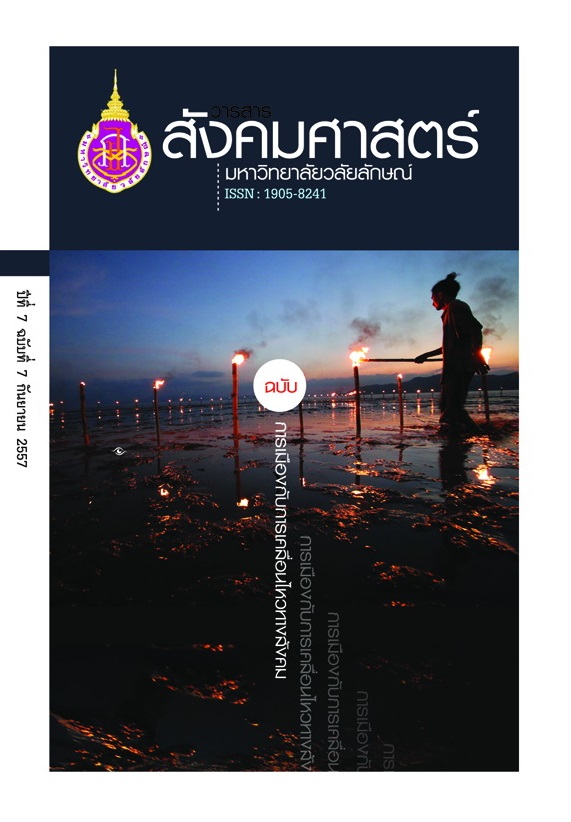The Problem of the Interpretation of Abortion Law (in Thai)
Main Article Content
Abstract
In view of abortion issue in Thailand, abortion is permissible and shall be not guilty under one of two conditions. According to Criminal Code, Section 305 provides that (1) abortion is allowed for the sake of the pregnant woman’s health or (2) abortion is allowed where a pregnancy is a result of the sexual abuse.
As a matter of fact, medical practitioners have also performed abortions for the reasons apart from the two mentioned reasons. The Medical practitioner generally performs abortion where it is found that having pregnancy would affect a pregnant woman suffering mental health or anticipation could tell an unborn baby’s high risk of serious disorders or genetic disorders. Such unborn baby suffering high risk of serious disorders is considered in terms of the pregnant woman’s mental health.
The right of abortions mentioned above is complied with Medical Council Regulation about the Rule of Termination of Pregnancy. On one hand, Criminal Law provides right of abortion merely where it is necessary on account of the health of a pregnant woman. On the other hands, Medical Council interprets that ‘mental health’ has been applied to the health of the pregnant woman; moreover, taking high risk in suffering serious disorders of unborn baby resulting in mental illness of the pregnant womanhas been applied to mental health. Therefore, Section 305 of Criminal Code is inconsistent with the Medical Council Regulation.
This article aims to show inconsistency of interpreting the law under Section 305 of Criminal Code and Medical Council Regulation about the Rule of Termination of Pregnancy. The article will provide analysis, interpretation; accordingly provide suggestion and resolution when it is found that an objective of law conflicts with the actual exercise of the law itself.
ปัญหาการตีความกฎหมายเกี่ยวด้วยการยุติการตั้งครรภ์
ประเด็นของการทำแท้งสำหรับประเทศไทยอนุญาตให้ทำแท้งโดยไม่เป็นความผิดได้ใน สองกรณีตามมาตรา 3051 ประมวลกฎหมาย อาญา กล่าวคือ การทำแท้งเมื่อการตั้งครรภ์ นั้นทำให้เกิดปัญหาต่อสุขภาพมารดาหรือการ ตั้งครรภ์ที่เกิดการกระทำความผิดทางเพศ แต่ในทางความเป็นจริงทางการแพทย์ได้มี การทำแท้งนอกเหนือจากการตั้งครรภ์ที่มีผลต่อสุขภาพกาย หรือการตั้งครรภ์เกิดจากการกระทำความผิดทางเพศแล้วยังมีการทำแท้งหาก การตั้งครรภ์นั้นมีผลต่อสุขภาพจิตใจของหญิง รวม ทั้งมีการทำแท้งในกรณีที่ทารกในครรภ์มีหรือมีความเสี่ยงสูงที่จะมีความ พิการอย่างรุนแรง หรือเป็นหรือมีความเสี่ยงสูงที่จะเป็นโรคพันธุกรรม อย่างรุนแรงอีกด้วย โดยถือว่าการที่ทารกในครรภ์มีสภาพบกพร่องนี้ ตีความรวมเป็นปัญหาสุขภาพจิตของหญิงอย่างหนึ่ง
การกระทำแท้งของแพทย์ในกรณีการตั้งครรภ์เป็นปัญหาต่อ สุขภาพจิตของหญิงและในกรณีทารกในครรภ์มีความบกพร่องนั้น เป็นการอาศัยอำนาจตามข้อบังคับของแพทยสภาว่าด้วยหลักเกณฑ์ การปฏิบัติเกี่ยวกับการยุติการตั้งครรภ์ทางการแพทย์ 2 ทั้งนี้การที่ ประมวลกฎหมายอาญาให้สามารถทำแท้งได้เฉพาะกรณีการตั้งครรภ์ นั้นมีผลต่อสุขภาพของหญิง แต่ข้อบังคับของแพทยสภาได้กำหนด คำว่าสุขภาพหมายความรวมถึงสุขภาพจิตใจของหญิงด้วย และ ความหมายสุขภาพจิตของหญิงนี้ให้รวมไปถึงกรณีทารกในครรภ์มีหรือ มีความเสี่ยงสูงที่จะมีสภาพร่างกายพิการ มีหรือมีความเสี่ยงสูงที่จะ เป็นโรคพันธุกรรมอีกกรณีหนึ่ง แสดงให้เห็นว่าประมวลกฎหมายอาญา กับสภาพข้อเท็จจริงในทางการแพทย์มีความไม่สอดคล้องกัน
บทความฉบับนี้จึงขอนำเสนอประเด็นความไม่สอดคล้องกัน ดังกล่าวระหว่างข้อยกเว้นการทำแท้งตามประมวลกฎหมายอาญา มาตรา 305 กับตามข้อบังคับแพทยสภาว่าด้วยหลักเกณฑ์การปฏิบัติ เกี่ยวกับการยุติการตั้งครรภ์ทางการแพทย์ ทั้งนี้เพื่อเป็นการวิเคราะห์ การตีความกฎหมายและนำเสนอแนวทางแก้ไขปัญหาการใช้กฎหมายขัดกับข้อเท็จจริงในทางปฏิบัติ
Article Details
Copyright: CC BY-NC-ND 4.0


